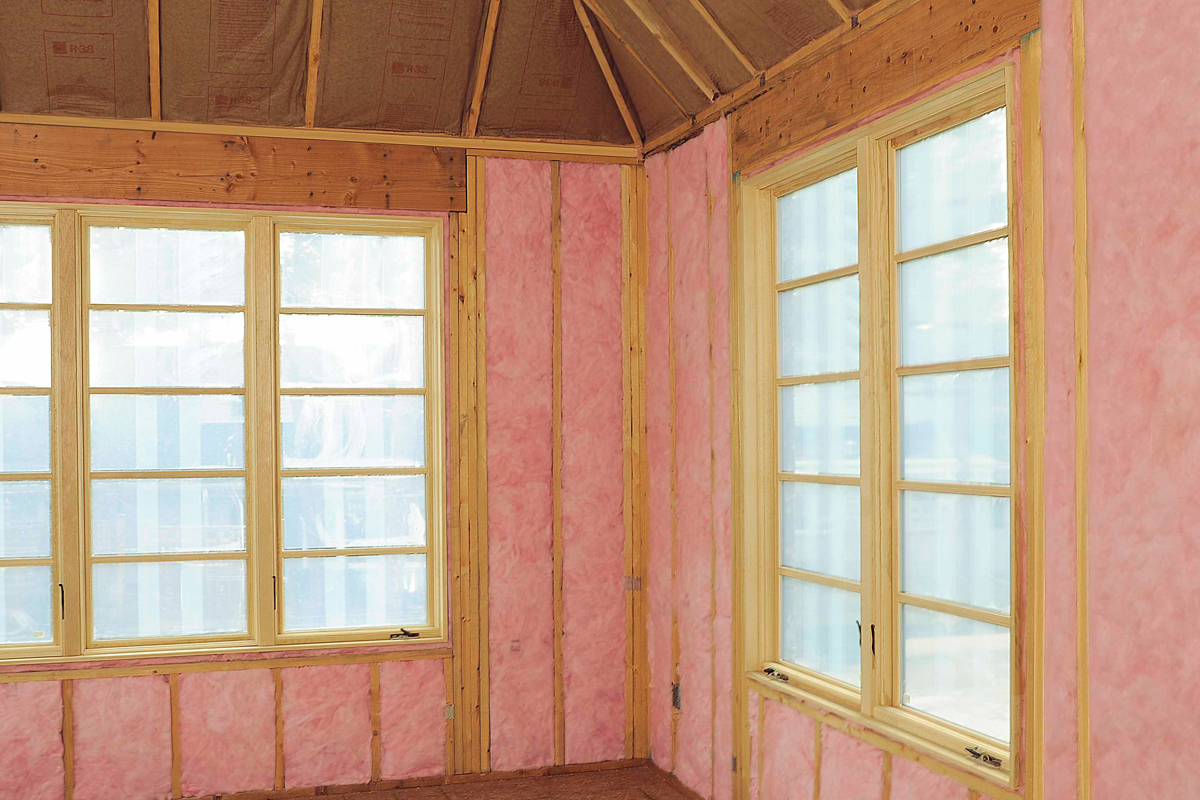Owens Corning (NYSE: OC) develops, manufactures and markets insulation, roofing, and fiberglass composites. Global in scope and human in scale, the company’s market-leading businesses use their deep expertise in materials, manufacturing and building science to develop products and systems that save energy and improve comfort in commercial and residential buildings. Ultimately, Owens Corning’s people and products make the world a better place. Based in Toledo, Ohio, Owens Corning posted 2016 sales of $5.7 billion and employs about 16,000 people in 26 countries.
Owens Corning, the pioneer of FiberglasTM, created EcoTouch® Batt Insulation with PureFiber® Technology, a revolutionary new product platform that includes an average of 65% recycled content, with minimum of 47% post-consumer recycled glass. The balance is 18% pre-consumer recycled glass content.[1] The product meets the strict certification standards for indoor air quality, is validated formaldehyde free and carries the GreenGuard Gold certification. EcoTouch® Insulation with PureFiber® Technology has even been named the greenest insulation by Green Builder magazine [2] and is the only fiberglass insulation product listed in the USDA Bio-Preferred Catalog because of its bio-based binder.
EcoTouch® Insulation with PureFiber® continues to deliver energy-saving and acoustical performance, as well as the installation ease our customers expect from Owens Corning®. EcoTouch® Insulation[3]:
- Is preferred by 2 out of 3 professional installers over all fiberglass insulation competitors for ease of handling and installation[4].
- Is easier to cut and split with less dust than other fiberglass insulation products.
- Installs faster than other fiberglass insulation products.
- Completely fills the cavity, eliminating gaps and the need for additional handwork.
- Is easily cut and split to insulate odd shaped cavities and around outlets, switches and other small spaces.
EcoTouch® Insulation with PureFiber® Technology manufactured in Owens Corning’s Santa Clara, California plant was chosen for the Living Product Challenge (LPC). The plant has been in continuous operation since July 5, 1949, is nearly waste-free and employs well-trained and engaged support staff. These factors made the product and facility combination a clear choice for the LPC.
The engagement began with a stakeholder meeting at Owens Corning’s research headquarters in Granville, Ohio, in early 2015. At that time, Owens Corning stakeholders learned about the vision, mission and potential value and traction of the LPC. Near the end of the year, Owens Corning announced at the Living Product Expo in Pittsburgh, Pennsylvania, that it had decided to extend its sustainability commitment and participate in the LPC.
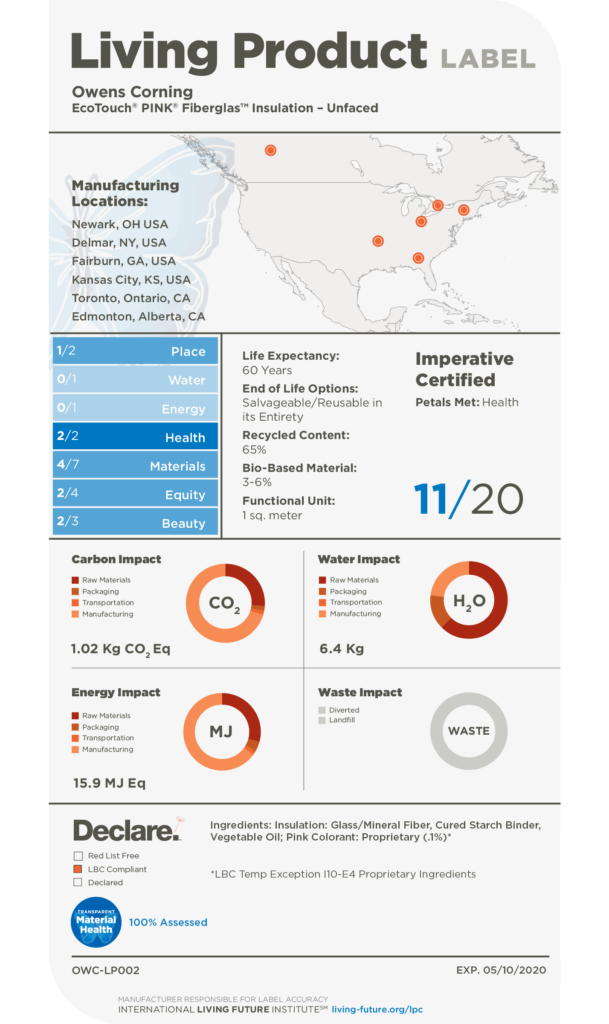
SCALING THE CERTIFICATION
In 2017- The Living Product Challenge Certification was expanded to cover EcoTouch® Insulation with PureFiber® Technology made at Owens Corning North American Insulation plants as presented below:
NORTH AMERICAN INSULATION PLANTS AND ESTABLISHED YEAR
- Newark, Ohio – 1930s
- Kansas City, Kansas – 1946
- Delmar, New York – 1976
- Waxahachie, Texas – 1963
- Fairburn, Georgia –1971
- Toronto, Ontario, Canada – 1978
- Edmonton, Alberta, Canada – 1960
PLACE PETAL
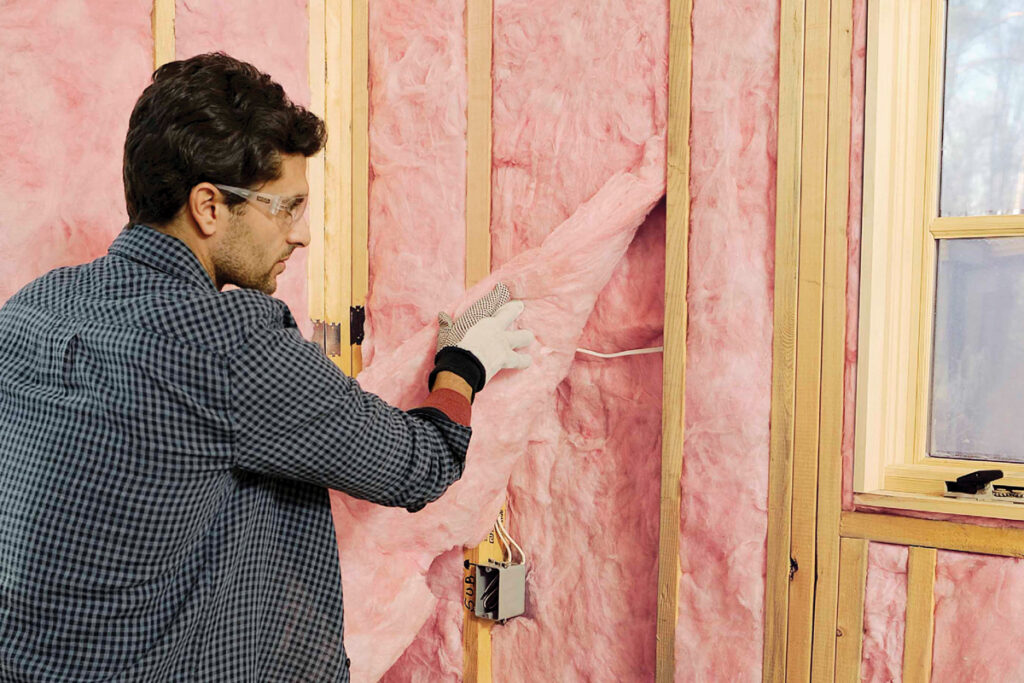
01. RESPONSIBLE PLACE & HABITAT IMPACTS IMPERATIVE
ECOTOUCH® INSULATION MANUFACTURING FACILITIES
| Facility Location | Total Land (Acres) | Building Size (Sq. ft) | Facts |
|---|---|---|---|
| Santa Clara, California | 42 | 750,000 | The Owens Corning Santa Clara, California plant was the first industrial plant in the United States designed specifically for the manufacture of insulation, as opposed to a converted glass bottling plant. |
| Newark, Ohio | 332 | 1,000,000 | Since the 1930s, the Owens Corning Newark, Ohio plant has been in the city, employing multiple generations of many of the same families. The Newark plant is in many ways the flagship ‐‐ the oldest and one of the largest in the company. |
| Kansas City, Kansas | 32 | 600,000 | The Kansas City plant was honored by the Kansas Water Environment Association in 2016. The plant was one of six companies to earn a new platinum award recognizing water reduction efforts, a good relationship with the state of Kansas and 100% compliance on environmental reporting for five or more years. |
| Delmar, New York | 200 | 675,000 | The Delmar plant has the largest onsite solar project in New York funded by NYSERDA as part of the NY State Sun Initiative Program. The 2.6‐megawatt (DC) solar PV supplies clean energy to the Delmar plant. |
| Waxahachie, Texas | 134 | 900,000 | The Waxahachie plant is involved in many community activities including Fuller Center for Housing, Habitat for Humanity, Red Cross, United Way, Salvation Army, and the North Texas Food Bank. |
| Fairburn, Georgia | 150 | 700,000 | The Fairburn plant achieved a million man-hours without a recordable injury in October 2016. |
| Toronto, Ontario | 50 | 330,000 | The Toronto plant is involved with Habitat for Humanity and United Way. |
| Edmonton, Alberta | 30 | 240,000 | The Edmonton plant is involved with United Way. |
Built in 1949, the Owens Corning Santa Clara, California plant was the first industrial plant in the United States designed specifically for the manufacture of insulation, as opposed to a converted glass bottling plant. The product ingredients are mostly inorganic and bio based materials and are not derived from endangered sources.
Owens Corning’s Santa Clara plant sits on 41.88 acres in Santa Clara County, California. The manufacturing facility constitutes over 17 acres of the land. Owens Corning does a biodiversity assessment for all of its sites. Santa Clara is not within 50 miles of any areas of ecological sensitivity or historical significance as defined by the following lists:
- United Nations Educational, Scientific and Cultural Organization (UNESCO) World Heritage Sites and Biosphere Sites
- Convention on Wetlands (Ramsar, Iran, 1971) – called the Ramsar Convention. The Convention lists Wetland of International Importance
- Natura 2000 List – Protected ecological areas in the European Union
- Alliance for Zero Extinction’s (AZE) list of epicenters of imminent extinctions
Owens Corning is committed to preserving the natural habitats that surround its operations around the world. An annual biodiversity assessment is completed by each plant; as of 2016, Owens Corning is in the process of developing and supporting company-wide biodiversity goals.
In 2015, Owens Corning began a partnership with the Wildlife Habitat Council (WHC) to standardize the approach to biodiversity throughout the company, develop biodiversity action plans using external expertise and site visits, and work towards third party WHC certification.
HEALTH & HAPPINESS PETAL
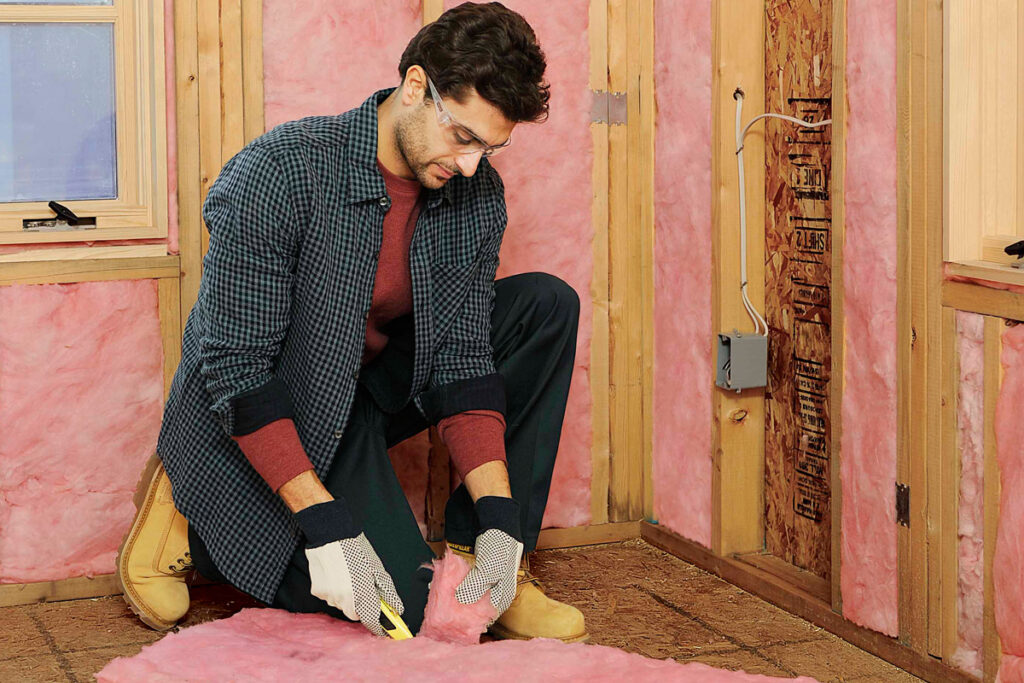
Owens Corning products, created from abundant materials such as sand, have the potential to transform people’s relationship to help improve the comfort of the building occupants. Owens Corning® insulation products improve the comfort of the building occupants by serving as a means to help control thermal transfer to the living space and save energy in regulating that temperature. Additionally, insulation products serve to reduce noise transfer, helping to create acoustics or quiet spaces for living and working.
Owens Corning is committed to the principles of environmental sustainability, product stewardship and to the safety and health of its employees.
To ensure a continuing commitment to these principles, Owens Corning is dedicated to:
Safety and Health:
- Providing safe working conditions.
- Promoting the health and well-being of our employees.
- Owens Corning was awarded the Green Cross award in 2014 by the National Safety Council for Owens Corning’s safety leadership at all levels of the organization.
Environmental Protection and Sustainability:
- Conserving resources, preventing waste, reducing greenhouse gases, and protecting the environment and our local communities.
- Continual improvement in our Environmental, Health and Safety (EHS) performance and pollution-prevention efforts.
- Use third-party organizations to test and certify product attributes and to disclose their environmental and human health impacts.
Product Stewardship:
- Providing products that are safe and environmentally sound to make, use, and dispose of; and that perform as claimed.
- Providing useful information on the performance and safe use of our products.
Since 2008, Owens Corning has offered different resources and incentives to motivate employees to reach their health goals. The company has various wellness programs for employees to participate in, and expanded its efforts with the development of six wellness pillars and corresponding teams to manage them:
- Know Your Numbers
- Healthy Mind
- Physical Activity
- Nutrition (Santa Clara plant has a free “healthy options” lunch and breakfast offering each day for employees)
- Tobacco-Free
- Financial Health
As a part of its wellness programs, Owens Corning encourages outdoor activities and creates spaces at its locations for employee interaction and exercise. Owens Corning is committed to preserving the natural habitats that surround its operations.
05. NET POSITIVE MATERIAL HEALTH IMPERATIVE
Owens Corning is committed to meeting the Net Positive Material Health Imperative by maintaining a strict standard of safety and a responsibility to its workforce to return home to their families in the same condition as when they arrived at the start of the workday. The company believes that its commitment to safety is unconditional and that all accidents are preventable. As a result of the pervasive safety culture, Owens Corning has had zero recorded fatalities for contractors and employees in over a decade. There has been one recordable injury at Santa Clara plant since November 2015. Additionally, from February 2016 to February 2017, the number of recordable injuries for other insulation plants have been; three for the Newark plant, one for the Kansas City plant, three for the Delmar plant, one for the Fairburn plant, and five for the Waxahachie plant. The injuries encouraged the plants to identify more ways to prevent future injuries.
The manufacturing of EcoTouch® Insulation with PureFiber® Technology has been purposefully designed to incorporate significant automated features to reduce the opportunity for injury and human error.
This product was assessed for material health through the Cradle to Cradle Product Innovation Institute and was certified at the Gold level [6]. The product is fully optimized, meaning that ingredients and process chemicals are optimal or acceptable for use. This assessment covered 100% of the materials at 100ppm.
06. HUMAN THRIVING IMPERATIVE
Owens Corning actively manages its nature and environmental impacts and has achieved a continuous reduction of manufacturing impact starting with a 2002 baseline. Aspects include waste, air emissions, water use, energy, and greenhouse gases. One company goal is to achieve zero waste at all of its facilities; the Santa Clara plant is well along the path of achieving a waste-free process for the EcoTouch® Insulation with PureFiber® Technology product line. In 2015, Santa Clara plant diverted 94% of the waste away from the landfill. The plant uses state-of-the-art automated equipment throughout which minimizes human interaction with the process. The reduced number of touch points help to create a safe environment and minimize repetitive tasks. Other Owens Corning insulation facilities are moving toward zero waste, making progress year after year.
Owens Corning encourages increased interaction with nature in its employee’s work and personal life. The company has instituted wellness programs and healthy living incentives to promote healthy lifestyle choices for employees. Employees are encouraged to maintain a healthy body weight with programs such as the annual Fat Out competition. Each year, the company distributes pedometers and coordinates scheduled weigh-ins to track employee progress towards their fitness goals. Participation in the program has been as high as 30% in recent years. Finally, the company’s wellness program has been a vehicle for motivation. Santa Clara plant has a free “healthy options” lunch and breakfast offering each day for employees to encourage healthy eating habits.
MATERIALS PETAL
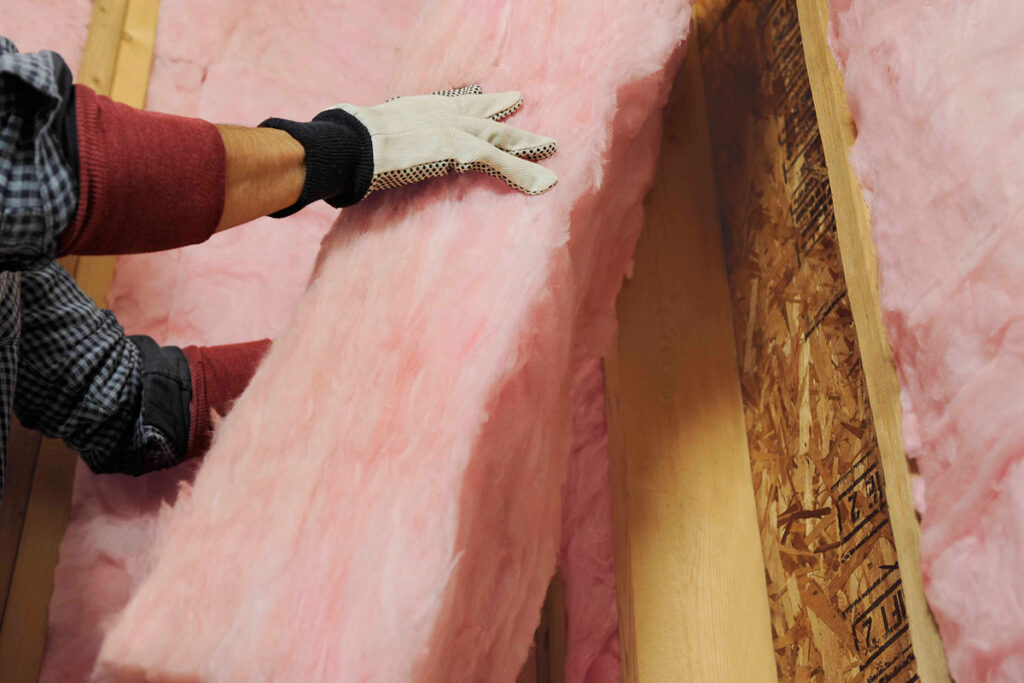
Owens Corning uses third-party organizations to test and certify product attributes and to disclose environmental and human health impacts. These certifications ensure that products meet a certain standard of recycled content, are low emitting after installation and have other features that may be of interest to architects, builders, installers and consumers. The Product Stewardship process ensures products are safe and environmentally sound to make, use, and dispose of; and perform as claimed.
Furthermore, Owens Corning’s approach to achieving the Materials Petal Imperatives is highlighted by showcasing the company’s initiatives to cultivate a responsible materials economy. Owens Corning’s EcoTouch® Insulation with PureFiber® Technology is largely created from abundant materials such as sand. Raw materials like sand and high levels of recycled glass content combine to minimize adverse impacts from a material resource perspective.
The commitment to using responsible materials is important to Owens Corning. This product was assessed for material health through the Cradle to Cradle Products Innovation Institute and was certified at the Gold level.
The product development team’s insight is in direct alignment with the Materials Petal Imperatives through the use of human centered design. The product is designed and manufactured to be used in a variety of applications that easily meet the insulating needs for attics, walls and other locations.
Overall, EcoTouch® Insulation products have socially equitable automated manufacturing and appropriately manage resource depletion through the high level of recycled content. The market-leading product is also a leader in terms of the equitable use of natural resources, materials usage, product design and innovative industrial practices.
07. RED LIST IMPERATIVE
Owens Corning uses third-party organizations to test and certify product attributes and to disclose environmental and human health impacts. There are several transparency paths used for Owens Corning products and many of them are market driven. As consumer demand for product transparency has increased, the company has implemented transparency initiatives to meet the demand. Owens Corning is on the leading edge and readily makes the commitment to expand its transparency offerings where they have value in the marketplace. EcoTouch® Insulation products are/have:
- GREENGUARD Certified® and GREENGUARD Gold Certified℠, (EcoTouch® Unfaced Batts and EcoTouch® Faced Batts and Rolls).
- GREENGUARD validated Formaldehyde Free (EcoTouch® Unfaced and EcoTouch® Faced Batts and Rolls).
- UL Certified Environmental Product Declaration in accordance with ISO 14025 (EcoTouch® Faced and Unfaced insulation).
- UL Environment EcoLogo CCD-106 (EcoTouch® Faced and Unfaced insulation).
- Recycled content verified by SCS Global Services; Scientific Certification Systems SCS-MC-01025, SCS Certified minimum 65% recycled glass content (with at least 41% post-consumer recycled and the balance of pre-consumer recycled glass content), applies to EcoTouch® Unfaced Batts and Rolls.
- USDA Certified Biobased Products: EcoTouch® unfaced – 98%
Additionally, the product:
- Achieved the Gold level of the Material Health Certification from the Cradle to Cradle Products Innovation Institute; and
- Approved for the National Green Building Standard; and
- Qualified under the Seal and Insulate with ENERGY STAR® program.
- As a part of pursuing the Living Product Challenge, Owens Corning has obtained DECLARE labels for EcoTouch® Insulation products.
08. LIVING ECONOMY SOURCING IMPERATIVE
Final percent by weight sourced from each zone (list):
- 1000 KM RADIUS 8-25%
- 2000 KM RADIUS 25-75%
- 5000 KM RADIUS 0-36%
| Material | % by Weight | Source Location | Distance (km) | Distance Range |
|---|---|---|---|---|
| Cullet | 25-75% | North America | 16-1290 km | 2000 km |
| Sand | 8-25% | North America | 16-400 km | 1000 km |
| Borates | 10-30% | Global | 560-9980 km | Any location |
| Soda Ash | 0.5-6% | North America | 560-3220 km | 5000 km |
| Other Oxides | 1-2% | North America | 360-3220 km | 5000 km |
| Limestone | 0-5% | North America | 200-320 km | 5000 km |
| Carbohydrate Polyol | 2-10% | North America | 800-3540 km | 5000 km |
| Bio-Based Polycarboxylic Acid | 1-5% | North America | 320-3220 km | 5000 km |
| Cure Accelerator | 0.2-1% | North America | 400-3700 km | 5000 km |
| Surfactant | 0-0.1% | North America | 640-3700 km | 5000 km |
| Vegetable Oil | 0-3.5% | North America | 800-3540 km | 5000 km |
| Silane | 0.03-0.1% | North America | 400-4350 km | 5000 km |
| Pink Colorant | 0.1-0.2% | North America | 560-4500 km | 5000 km |
09. RESPONSIBLE INDUSTRY IMPERATIVE
Owens Corning’s EcoTouch® Insulation with PureFiber® Technology uses materials that are in abundant supply and leverage high levels of recycled content. Sand is a major raw material in glass manufacturing and Owens Corning is committed to seek out sources in reasonable proximity to its operations. Purchasing recycled glass prevents material from being sent to landfill while serving as an outlet for glass that is no longer in service. EcoTouch® Insulation with PureFiber® Technology uses a bio-based binder.
The company is also committed to fair labor practices and is a signatory to the UN Global Compact. The Santa Clara plant is staffed by workers that are local to the Santa Clara community and wages are equitable for the area. The Owens Corning Human Rights policy is in effect and complies with reporting on Conflict Minerals. Materials used for this product are not derived from vulnerable or endangered sources. Declare Labels were issued for EcoTouch® Insulation with PureFiber® Technology in 2016.
DECLARE IDS: OWC-1003, OWC-0014, OWC-0015, OWC-0016, OWC-0017, OWC-0018, OWC-0019, OWC-0020.
11. NET POSITIVE WASTE IMPERATIVE
SANTA CLARA INSULATION PLANT ONLY
One company goal is to achieve zero waste at all our facilities; the Santa Clara plant is well along the path of achieving a waste free process for the EcoTouch® Insulation with PureFiber® Technology product line. In 2015, Santa Clara plant diverted 94% of the waste from the landfill. The company uses recycled content in the form of purchased cullet in the manufacture of fiberglass products and works to reduce waste from the line by recycling scrap material back in to the process, where feasible. Other Owens Corning insulation plants, although on the path to achieve the company’s zero waste goal, did not meet the Net Positive Waste Imperative at this time.
12. PRODUCT FIT TO USE IMPERATIVE
Owens Corning building insulation products are designed to help save energy through the life of the building, approximately 60 years. The products undergo rigorous internal competitive audits to ensure that the company is providing the best product to its customers. Design teams travel throughout the year visiting facilities to quantify the quality of our product and its fitness. Products are evaluated based on critical product performance characteristics, insulating R-value, installation ease and other characteristics.
Product Stewardship reviews are required for all new and modified products. These rigorous reviews ensure that products are safe and environmentally sound to make, use, and dispose of; and perform as claimed. Information on the performance and safe use of the products is also part of the review process.
Testing product fitness for use is also important from a research and development standpoint. Products are tested throughout the development process to identify any potential defects early in product design. The test-and-learn strategy is used to allow innovative ideas to emerge with little downside risk. The pervasive testing culture encourages innovation from the lab bench that is manifested on the production line.
EQUITY PETAL
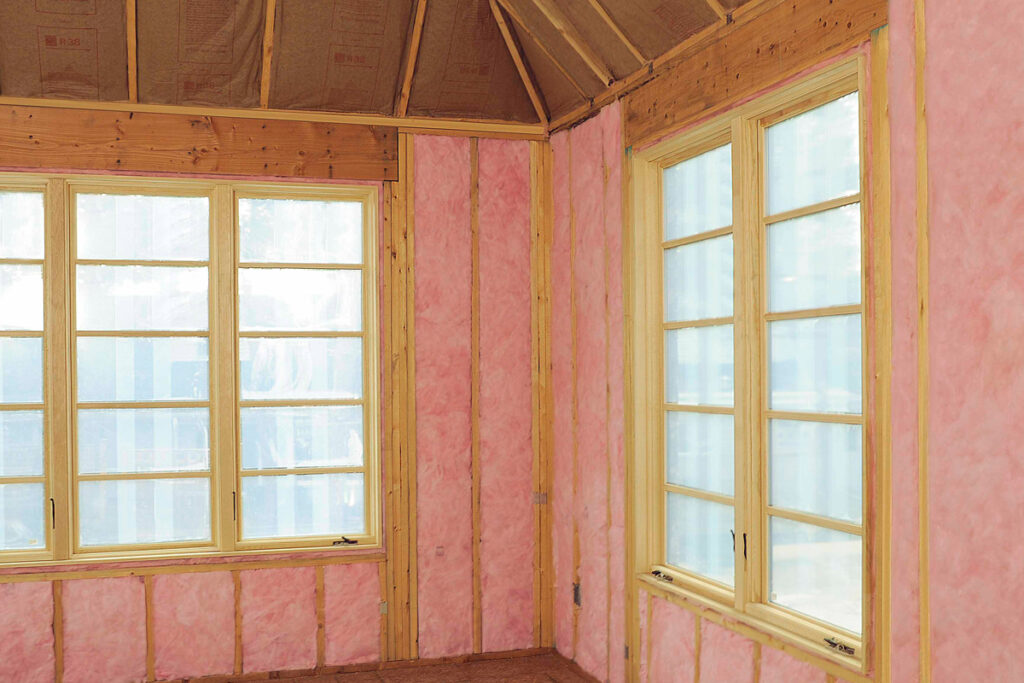
14. EQUITABLE PRODUCT ACCESS IMPERATIVE
Owens Corning’s materials are broadly available to the market through a variety of channels, both direct and through other distribution channels, lumber yards and also home centers across the United States. Owens Corning prices its products in a fair and lawful manner and we believe the prices for our products are in line with prevailing market prices in the regions where such products are sold.
15. RESPONSIBLE CO-PRODUCTS IMPERATIVE
Owens Corning does not directly engage in any of the following activities:
- Make weapons or armaments of any kind;
- Produce tobacco products, pornography, violent video games, or illicit drugs;
- Engage in fossil fuel extraction;
- Engage in nuclear energy production or nuclear weapons manufacturing;
- Engage in or facilitate prostitution, payday lending, gambling or the patenting of life; or
- Charge interest rates significant in excess of market peers for comparable offerings.
Owens Corning demonstrates consistent responsibility across its entire operations footprint.
beauty petal
19. BEAUTY & SPIRIT IMPERATIVE
Insulation products have the potential to influence an individual’s relationship to the natural world through their design. Owens Corning’s EcoTouch® Insulation with PureFiber® Technology are artfully designed and pleasing to use.
ECOTOUCH® INSULATIOn
- Is preferred by 2 out of 3 professional installers over all fiberglass insulation competitors for ease of handling and installation.
- Is easier to cut and split with less dust than other fiberglass insulation products.
- Installs faster than other fiberglass insulation products.
- Completely fills the cavity, eliminating gaps and the need for additional handwork.
- Is easily cut and split to insulate odd shaped cavities and around outlets, switches and other small spaces.
EcoTouch® Insulation with PureFiber® Technology is an innovative solution to compete with a variety of materials for insulating walls, ceilings and under roof decks. It is designed with variety of insulation values (R- values) to meet needs for any insulation applications and code requirements. Professionals prefer Owens Corning EcoTouch® PINK® FIBERGLAS™ Insulation with PureFiber® Technology because it is easy to handle and install.
The beauty of the product is evident in its leveraging of minute details to the benefit of the DIY homeowner and remodeling contractor. By keeping the end user in mind, Owens Corning exemplified how innovative, human centered design can bring beauty to building materials.
20. INSPIRATION & EDUCATION IMPERATIVE
WEBSITE LPC Page
SUMMARY OF PROCESS & BENEFIT OF PURSUING LIVING PRODUCT CHALLENGE
Owens Corning’s participation in the Living Product Challenge has been enlightening and empowering. The iterative process allowed them to feel a sense of ownership. We were able to effectively tailor the program in order for the stringent requirements to be applicable to the supply chain and standards within the insulation industry. The company is proud to pilot the program as it exemplifies our commitment to be on the leading edge of sustainability and forward thinking. We are honored and excited to show the sustainable aspects of our products and how they can contribute to a sustainably built infrastructure.
Copyright © 2017 Owens Corning. All Rights Reserved.

